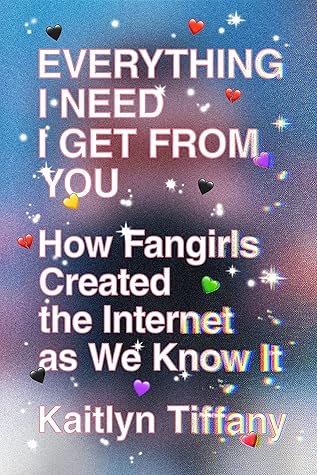More on this book
Community
Kindle Notes & Highlights
Read between
August 21 - August 27, 2022
Women are the ones fueling the engine “for the accumulation of vast piles of capital,” Weigel wrote, and they are not the ones generally benefiting from it.
Yet a fangirl still exists in contradiction to the dominant culture. She’s not considered normal or sane; her refusal to accept things the way they are is one of her defining characteristics. She is dropping out of the mainstream even while she embraces a thing that is as mainstream as a thing can get.
The legacy is something else: the people who took the paragon of a commercial product and made it the foundational text of a new kind of culture. Their indefatigable belief that the dull, senseless pain of modern life could be undone—the world remade in the likeness of a pop song.
“Being a fan is very much associated with feminine excess, with working-class people, people of color, people whose emotions are seen as being out of control,” says Allison McCracken, an associate professor and director of the American studies program at DePaul University. “Everything is set up against this idea of white straight masculinity, where the emotions are in control and the body is in control.”
they announce the absurdity of knowing enough about One Direction to appreciate them.
He was disdainful of high art as well, which could be created only through patronage made possible by wealth accumulation. His issue was not exactly the quality of the music, though he sometimes undermined himself with blanket statements about that too, but the cold, systematized manner in which it was produced and sold. To him, the culture industry— a term he coined so that he would not have to use the term “mass culture,” which implied too much agency on the part of said masses—was the exact opposite of possibility. It secured the status quo. It offered only a brief respite from work,
...more
And of the type of person who could fall for all of this, he wrote with a tinge of sympathy that they must have “free time and little freedom.”
What I like about it is its senselessness and the creator’s evident delight in her own unusual mind; it invokes the nightmarish nonsense of love for a stranger and the hilarity of losing control, and when I see it, I remember what I wanted more than anything when I was nineteen years old. I wanted something to happen to me that couldn’t be described.
Before most people were using the internet for anything, fans were using it for everything.
(Rule 34—“if it exists, there is porn of it”— is so well known that it’s regularly quoted by people who probably can’t name the source or a single other “rule.” Same for Rule 32, “pics or it didn’t happen.”) Rule 30 is “there are no girls on the internet,” and it’s followed by a correlated rule, number 31, “tits or GTFO,” a common refrain from the days in which any internet user claiming to be a woman was demanded to prove it with a photo of her body.
a looming “digital dark age,” when cultural history that is maintained only at will by for-profit corporations erodes and falls away, leaving huge gaps in future generations’ understandings of who we were.31
The One Direction trash openly complain about the demands that the band places on their time or on their wallets.
Calling yourself “trash” is a way of accepting all of these external characterizations, as well as pointing out that they don’t matter.
“At one level, fans are ideal consumers,” he told me. “They’re deeply invested in the performer and they’ll buy all kinds of merchandise related to that performer. But fans reject the basic relationship that is set up by the industry. They’re always trying to push beyond the basic exchange of money. The entertainment industry is a tool or mechanism for fandom, but it’s not what fandom is.”
“I think the smartest people I know are Taylor Swift fans, to be honest,”
“The importance of fandom for personal identity is not so much about the disorder caused by the mass media as it is about the order found in devotion.”
These songs will sound right, even if they hit me differently. I felt almost entirely normal and almost exactly like myself.
and when your friends say this boy band isn’t very good, you’ll invite them to argue with millions of people who have nothing else in common and can’t all be wrong.
There is no such thing as fan internet, because fan internet is the internet.
At its best, fandom is an inside joke that never ends.


